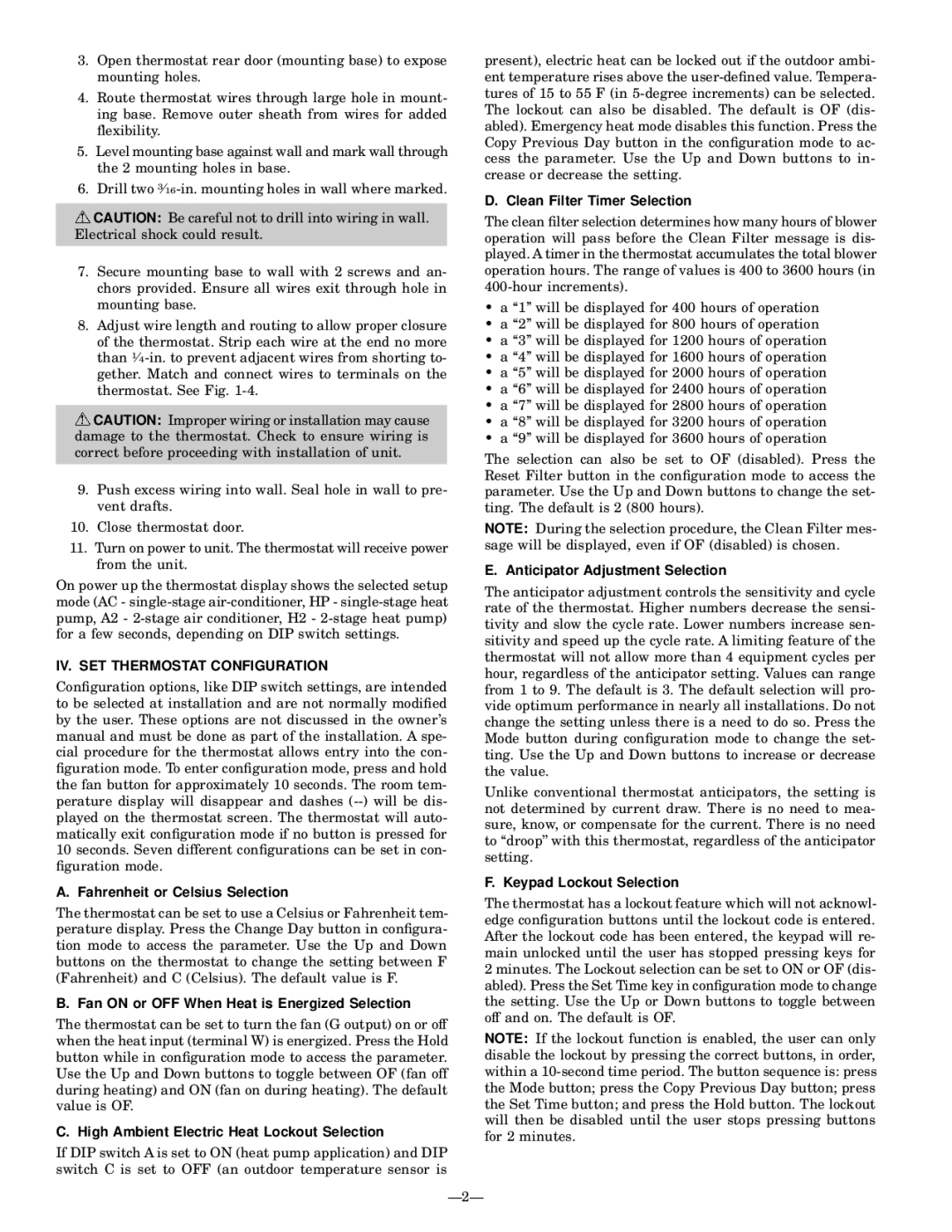
3.Open thermostat rear door (mounting base) to expose mounting holes.
4.Route thermostat wires through large hole in mount- ing base. Remove outer sheath from wires for added ¯exibility.
5.Level mounting base against wall and mark wall through the 2 mounting holes in base.
6.Drill two
![]() CAUTION: Be careful not to drill into wiring in wall. Electrical shock could result.
CAUTION: Be careful not to drill into wiring in wall. Electrical shock could result.
7.Secure mounting base to wall with 2 screws and an- chors provided. Ensure all wires exit through hole in mounting base.
8.Adjust wire length and routing to allow proper closure of the thermostat. Strip each wire at the end no more than
![]() CAUTION: Improper wiring or installation may cause damage to the thermostat. Check to ensure wiring is correct before proceeding with installation of unit.
CAUTION: Improper wiring or installation may cause damage to the thermostat. Check to ensure wiring is correct before proceeding with installation of unit.
9.Push excess wiring into wall. Seal hole in wall to pre- vent drafts.
10.Close thermostat door.
11.Turn on power to unit. The thermostat will receive power from the unit.
On power up the thermostat display shows the selected setup mode (AC -
IV. SET THERMOSTAT CONFIGURATION
Con®guration options, like DIP switch settings, are intended to be selected at installation and are not normally modi®ed by the user. These options are not discussed in the owner's manual and must be done as part of the installation. A spe- cial procedure for the thermostat allows entry into the con- ®guration mode. To enter con®guration mode, press and hold the fan button for approximately 10 seconds. The room tem- perature display will disappear and dashes
A. Fahrenheit or Celsius Selection
The thermostat can be set to use a Celsius or Fahrenheit tem- perature display. Press the Change Day button in con®gura- tion mode to access the parameter. Use the Up and Down buttons on the thermostat to change the setting between F (Fahrenheit) and C (Celsius). The default value is F.
B. Fan ON or OFF When Heat is Energized Selection
The thermostat can be set to turn the fan (G output) on or off when the heat input (terminal W) is energized. Press the Hold button while in con®guration mode to access the parameter. Use the Up and Down buttons to toggle between OF (fan off during heating) and ON (fan on during heating). The default value is OF.
C. High Ambient Electric Heat Lockout Selection
If DIP switch A is set to ON (heat pump application) and DIP switch C is set to OFF (an outdoor temperature sensor is
Ð2Ð
present), electric heat can be locked out if the outdoor ambi- ent temperature rises above the
D. Clean Filter Timer Selection
The clean ®lter selection determines how many hours of blower operation will pass before the Clean Filter message is dis- played. A timer in the thermostat accumulates the total blower operation hours. The range of values is 400 to 3600 hours (in
·a ``1'' will be displayed for 400 hours of operation
·a ``2'' will be displayed for 800 hours of operation
·a ``3'' will be displayed for 1200 hours of operation
·a ``4'' will be displayed for 1600 hours of operation
·a ``5'' will be displayed for 2000 hours of operation
·a ``6'' will be displayed for 2400 hours of operation
·a ``7'' will be displayed for 2800 hours of operation
·a ``8'' will be displayed for 3200 hours of operation
·a ``9'' will be displayed for 3600 hours of operation
The selection can also be set to OF (disabled). Press the Reset Filter button in the con®guration mode to access the parameter. Use the Up and Down buttons to change the set- ting. The default is 2 (800 hours).
NOTE: During the selection procedure, the Clean Filter mes- sage will be displayed, even if OF (disabled) is chosen.
E. Anticipator Adjustment Selection
The anticipator adjustment controls the sensitivity and cycle rate of the thermostat. Higher numbers decrease the sensi- tivity and slow the cycle rate. Lower numbers increase sen- sitivity and speed up the cycle rate. A limiting feature of the thermostat will not allow more than 4 equipment cycles per hour, regardless of the anticipator setting. Values can range from 1 to 9. The default is 3. The default selection will pro- vide optimum performance in nearly all installations. Do not change the setting unless there is a need to do so. Press the Mode button during con®guration mode to change the set- ting. Use the Up and Down buttons to increase or decrease the value.
Unlike conventional thermostat anticipators, the setting is not determined by current draw. There is no need to mea- sure, know, or compensate for the current. There is no need to ``droop'' with this thermostat, regardless of the anticipator setting.
F. Keypad Lockout Selection
The thermostat has a lockout feature which will not acknowl- edge con®guration buttons until the lockout code is entered. After the lockout code has been entered, the keypad will re- main unlocked until the user has stopped pressing keys for 2 minutes. The Lockout selection can be set to ON or OF (dis- abled). Press the Set Time key in con®guration mode to change the setting. Use the Up or Down buttons to toggle between off and on. The default is OF.
NOTE: If the lockout function is enabled, the user can only disable the lockout by pressing the correct buttons, in order, within a
